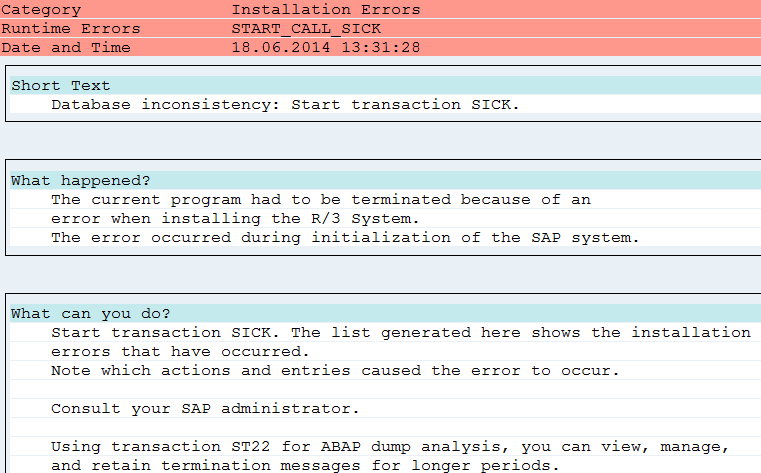Error START_CALL_SICK CPU timers not synchronized. Check note 1036194
Este error se soluciona modificando el BOOT.INI con el siguiente comando en modo administrador:
bcdedit /set {current} useplatformclock true
Se reinicia el equipo y se corrige el detalle.
Aquí el detalle de la nota: 1036194 Ojo con la versión ya que solo aplican en windows 2003 no en sistemas con NW 7.x o superiores donde se recomiendo hacer actualización de Kernel.
|
Symptom THIS NOTE IS OUTDATED !!! Do not use it anymore on newer Windows operationg systems (> Windows Server 2003). Even on Windows Server 2003 (if running on current hardware) it is no longer valid. If you get the error «OS timers are not synchronized» and the symptoms below, upgrade to a newer SAP kernel – especially if you still use a 7.00 kernel.
=====================================================================================
On Windows Server 2003, or Windows Server 2008 (R2) the SAP high resolution timer delivers incorrect values. This note does not apply to Windows Server 2012 or higher. There are the following symptoms:
Other Terms AMD, X2, Opteron, Dual Core, Quad Core, Processor Driver, timers, sapntchk, QueryPerformanceCounter, /usepmtimer, bcdedit, useplatformclock Reason and Prerequisites Older SAP ABAP kernels prior to 7.20 use the WIN32 API QueryPerformanceCounter / QueryPerformanceFrequency function to calculate high resolution timestamps. By default, Windows uses processor counters that increase with the processor frequency. Newer CPU technologies from Intel or AMD vary this frequency depending on the processor load. In this environment these registers are not synchronized between the processors, and the timestamps are no longer useable for our purpose. Solution The following solutions are available for SAP kernels prior to 7.20. SAP kernels 7.20 and higher use a completely redesigned timer calculation method which does not depend any longer on Windows performance counters and processor frequency. For older kernels you can use these solutions: Windows Server 2003: The processor driver ensures that QueryPerformanceCounter uses appropriate sources. Alternatively, set key /usepmtimer in boot.ini. Known issues: SQL Server 2005 might be affected from inaccurate CPU frequencies. For more information, see MS KB 931279, 938448, and 895980. Windows Server 2008 or Windows Server 2008 R2: For SAP kernel release 7.01 and 7.20, refer to SAP note 1466511. For all other releases: Reboot your Windows operating system. To verify that this switch is set correctly, use the command: To get an overview about the Windows boot loader configuration, set «useplatformclock» to «Yes». Windows Boot Loader |
Error START_CALL_SICK CPU timers not synchronized. Check note 1036194

